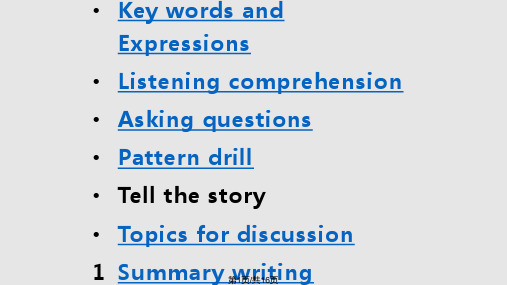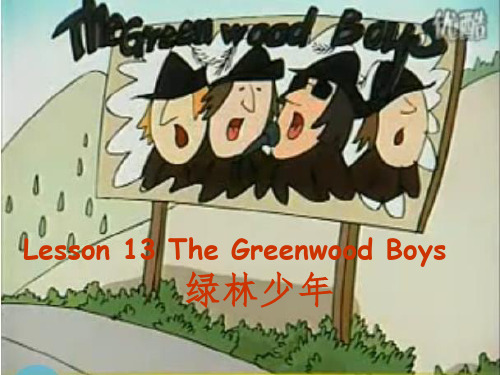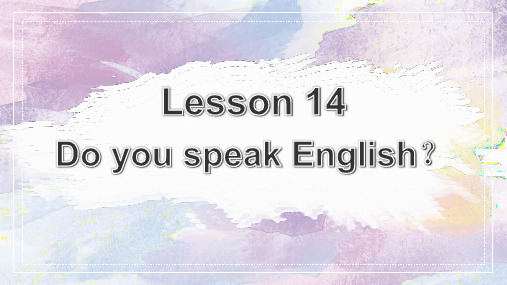新概念英语第二册lesson 14 精品课件
合集下载
新概念二lesson 14PPT课件

第12页/共16页
Topics for discussion
• 1 Have you ever asked for a lift, or given one? If so ,describe the person you met.
•
• 2 Describe the various ways you are able to recognize a foreigner in your country.
• I had nearly reached the town, when the young man suddenly said, very slowly,
第15页/共16页
感谢您的观看!
第16页/共16页
• 过去完成时
• 过去完成时:由had+过去分词构成,它表示过去某时或某动作发 生之前已经完成的动作或情况,即“较早的过去”。过去完成时 一定要以一个过去时态作铺垫, 这个动作一定要发生在had done 之后。
• 在用过去完成时态的句子中,常用连词when,after,as soon as,until,by that time等。常与现在完成时连用的副词如 already,just,never,never…before也常与过去完成时连用, 以强调事件发生的先后次序:
What did you have last year? What part of France were you in? Had you been in a small village? Where did you drive on to? Who waved to you on the way? What did he ask you for? When did you say good morning to him? What language did you speak? Did your passenger reply in French? How many words of French do you know? Did you speak to him during the journey? When did he suddenly say something? What did he ask you?
新概念英语第二册14ppt课件

in order to do: 为了….
eg. They did anything in order to make money.
.
12
7.It is always the same on these occasions.
occasion:〔c〕(特别的)场合,时刻
on these occasions在这些场合下 on this〔that〕occasion: 在这种〔那种〕场合 on many occasions: 在许多场合 on one occasion: 有一次 on another occasion 还有一次 on the first occasion:一有机会就….. I’ll contact you on the first occasion.
at the Workers' Club 在工人俱乐部
stay v. 停留,呆(延续性动词)
stay + 一段时间
eg. I can only stay a few minutes.
我只能呆几分钟。
stay at home 呆在家里
stay in bed 呆在床上
stay up 熬夜,通宵不睡
.
8
4.During this time, they will give five performances.
meet sb 去接某人 meet sb off 去送某人
.
7
Language Points
Tomorrow evening they will be singing at the Workers' Club. The Greenwood Boys will be staying for five days.
新概念2 第14课ppt课件

Motto
All things come to those who wait.
Lesson 14
Do you en to the tape
• listen to the tape write down what you heard as much as possible:
I had nearly reached the town, when the young man suddenly said, very slowly, "Do you speak English?' As I soon learnt, he was English himself!'
Motto
go on a trip = go on business
travel n. 周游(长途旅行) tour n. 游玩(为了玩) tourist n. 游客 voyage n. 旅行(海上) flight n. 空中飞行
【Text】
After I had left a small village in the south of France, I drove on to the next town. after引导的从句如果一个是过去时, 一个是过去完成时,那一定是从句用 过去完成时;before引导的从句表 示“在……之前”,主句发生在从句之 前, 主句用过去完成时。
reply v. 回答 reply与answer的区别: ① 作为不及物动词是一样的 :
He answered/replied. ② 作为及物动词就不一样了 :
answer sth. answer the letter 回信
reply to sth. I will reply to the letter.
All things come to those who wait.
Lesson 14
Do you en to the tape
• listen to the tape write down what you heard as much as possible:
I had nearly reached the town, when the young man suddenly said, very slowly, "Do you speak English?' As I soon learnt, he was English himself!'
Motto
go on a trip = go on business
travel n. 周游(长途旅行) tour n. 游玩(为了玩) tourist n. 游客 voyage n. 旅行(海上) flight n. 空中飞行
【Text】
After I had left a small village in the south of France, I drove on to the next town. after引导的从句如果一个是过去时, 一个是过去完成时,那一定是从句用 过去完成时;before引导的从句表 示“在……之前”,主句发生在从句之 前, 主句用过去完成时。
reply v. 回答 reply与answer的区别: ① 作为不及物动词是一样的 :
He answered/replied. ② 作为及物动词就不一样了 :
answer sth. answer the letter 回信
reply to sth. I will reply to the letter.
新概念第二册14课-PPT课件

.
11
1.What happened when the writer was driving to a town in France?
A young man waved to him.
2.What did the young man say at the end of the journey?
Do you speak English?
1.两个动作had left 和 drove on ,都发生在过去,先发生的动 作用 过去完成时 , 后发生的动作用 一般过去时
2. in the south of 在·····南部
.
14
1.我吃完晚饭后就去散步了
After I had had my dinner, I went for a walk
2. 火车站在城市的南部
The railway station is in the south of the city.
.
15
On the way,a young man waved
to me.I stopped and he asked me
for a lift.
1. wave to sb 昨天在图书馆一个漂亮的女孩向我招手. A beautiful girl waved to me in the library yesterday.
"Do you himself!
speak
English?'
_A_s_____
I
soon
learnt,
he
was
English
.
13
I had an amusing experience last year. After I had left a small village in the south of France, I drove on to the next town.
新概念英语第二册lesson14(共23张PPT)

一直延续到现在的动作。 • 过去的过去,有两个过去
过去完成时态
• 基本结构:主语+had+过去分词(done) • The children ran away after they had broken
the window. • ①肯定句:主语+had+过去分词+其他 • They had broken the window. • ②否定句:主语+had+not+过去分词+其他 • They hadn't broken the window.
• 2. Do they talk with each other? And why? • 3.Did you meet foreigners before? • Did you talk to them?
★amusing adj. 好笑的,有趣的
• amused adj. 感到好笑的 • amusing 修饰物, amused 修饰人 • The story amused me. • The story is amusing.
On the way 在路上 In the way 挡路 He tried to get to the door, but the table was in the way. 他试图走近大门,可是桌子挡住了去路。 By the way 顺便说 By the way, how is your mother? 顺便问一下,你妈妈怎么样?
• A. before B. a long time after • C. just after D. a moment before
• 2. “Good morning,” I ____D_.
• A. spoke B. talked
过去完成时态
• 基本结构:主语+had+过去分词(done) • The children ran away after they had broken
the window. • ①肯定句:主语+had+过去分词+其他 • They had broken the window. • ②否定句:主语+had+not+过去分词+其他 • They hadn't broken the window.
• 2. Do they talk with each other? And why? • 3.Did you meet foreigners before? • Did you talk to them?
★amusing adj. 好笑的,有趣的
• amused adj. 感到好笑的 • amusing 修饰物, amused 修饰人 • The story amused me. • The story is amusing.
On the way 在路上 In the way 挡路 He tried to get to the door, but the table was in the way. 他试图走近大门,可是桌子挡住了去路。 By the way 顺便说 By the way, how is your mother? 顺便问一下,你妈妈怎么样?
• A. before B. a long time after • C. just after D. a moment before
• 2. “Good morning,” I ____D_.
• A. spoke B. talked
新概念英语第二册++lesson+14+课件

park with your friends. 3.After you’ve travelled a lot, you can say, ‘I have a lot of
travel e_x_p_e_r_ie_n_c_e.s’ 4.The picture is so _a_m__u_s_in_g_.
neither of ... 两者都不…… none of ... 表示“(三个或以上)都不”
Practice :Complete the article
I had an amusing experience last year. After I had left a small village in the south of France, I drove on to the next town. On the way, a young man waved to me. I stopped and he asked me for a lift. As soon as he had got into the car, I said good morning to him in French and he replied in the same language. Apart from a few words, I do not know any French at all. Neither of us spoke during the journey. I had nearly reached the town, when the young man suddenly said, very slowly, "Do you speak English?' As I soon learnt, he was English himself!'
travel e_x_p_e_r_ie_n_c_e.s’ 4.The picture is so _a_m__u_s_in_g_.
neither of ... 两者都不…… none of ... 表示“(三个或以上)都不”
Practice :Complete the article
I had an amusing experience last year. After I had left a small village in the south of France, I drove on to the next town. On the way, a young man waved to me. I stopped and he asked me for a lift. As soon as he had got into the car, I said good morning to him in French and he replied in the same language. Apart from a few words, I do not know any French at all. Neither of us spoke during the journey. I had nearly reached the town, when the young man suddenly said, very slowly, "Do you speak English?' As I soon learnt, he was English himself!'
新概念英语第二册第14课精品课件
• Everyone experiences these problems at some time in their lives.
• experienced adj. 有经验的,经验丰富的
• He is an experienced doctor. • inexperienced 无经验的,不熟练的 • eg. He is inexperienced in looking after children
等意义: • He talked on until everybody had gone.
• I was reading when my friend called. After he had gone, I went on to read.
• 我朋友来看我时我正在看书。他走了以后我便继续看书。
• 原文:... in the south of France
reply [ri'plai] v. 回答 language ['læ ŋɡwidʒ] n. 语言 journey ['dʒə:ni] n. 旅行
• 1. amusing adj. 令人发笑的 • The story is amusing. (好笑的) • amused adj. 感到好笑的 • I am amused. • amuse v. 使发笑,使愉快 • The story amuses me. • be amused at/by 因为感到好笑 • be amused to do sth 做..取乐 • E.g.:Everyone was amused at the cute boy. • The amusing story amused the children.
Lesson 14 Do you speak English?
• experienced adj. 有经验的,经验丰富的
• He is an experienced doctor. • inexperienced 无经验的,不熟练的 • eg. He is inexperienced in looking after children
等意义: • He talked on until everybody had gone.
• I was reading when my friend called. After he had gone, I went on to read.
• 我朋友来看我时我正在看书。他走了以后我便继续看书。
• 原文:... in the south of France
reply [ri'plai] v. 回答 language ['læ ŋɡwidʒ] n. 语言 journey ['dʒə:ni] n. 旅行
• 1. amusing adj. 令人发笑的 • The story is amusing. (好笑的) • amused adj. 感到好笑的 • I am amused. • amuse v. 使发笑,使愉快 • The story amuses me. • be amused at/by 因为感到好笑 • be amused to do sth 做..取乐 • E.g.:Everyone was amused at the cute boy. • The amusing story amused the children.
Lesson 14 Do you speak English?
新概念英语第2册课件Lesson14(共40页)
▪ Language 1)语言 ▪ speak a language,讲一门语言 ▪ a foreign language, the second language ▪ native language 母语 ▪ The native language is Chinese. ▪ mother tongue 母语(口语中用) ▪ My mother tongue is Chinese. ▪ 2)除了文字以外的传达,人造语言 ▪ body language,sign language
this job. (经验,不可数名词) ▪ Does she have any experience in teaching? ▪ ③ vt. 经验,体验 ▪ Have you ever experienced anything like this? ▪ The village has experienced great changes
Because of them thought the other was French and both of them knew little French.
Key Words and Expressions
amusing
a. 有趣的
experience
n. 经验,体验
wave
v. 挥手
ask sb. for a lift 要求搭车
▪ ★experience n. 经历(可数);经验(不可数) ▪ ① n. 经历(可数) ▪ He has a lot of experiences. (经历,可数名词) ▪ ② n. 经验,体验(不可数) ▪ They want someone with a lot of experience for
新概念英语第二册lesson14(共27张PPT)
• reply vi 回答,答复 • eg. She has replied to my letter. Replay to a question 回答一个问题 • answer • 1)vt. (用语言的,行为的)回答,答复 • Eg. Did you answer her letter ? • Eg, I answered his insult with a blow. • 2)vt. 应接,应答 • Answer the door • Answer the telephone • 3)answer back/talk back 顶嘴 • 4)answer for 代表,对某事负责 • Eg. It will answer for our purpose • Respond vi • 1) 回答,应答 • Eg. She didn’t respond to my question • Eg. She didn’t respond to my letter • 2)对……作出回答或反应 • Eg. He respond to the insult with a punch
• Trip n (美)包括乘短途交通工具以及徒步远足的所有旅行
•
(英)通常指短途的观光旅行
• A bus trip
• A business trip
• Take a trip
• Voyage 航海,航行,乘船旅行
• Eg. Go on a voyage around the world
• 做环游世界的旅行
• Eg. As soon as the sun had set we returned to our hotel.
• Eg. The children ran away after they had broken the window.
新概念英语第二册第14课课件
amuse
v. 使发笑,使愉快
The story amused me.
interesting / funny story
好笑的(不一定要笑出声可以指贬义)
请输入您的标题
experience
[ɪkˈspБайду номын сангаасərɪəns] n.
He has a lot of experiences.
经历,可数名词
They want someone with a lot of experience for this job.
太阳一下山,老人就回到旅店。
As soon as the sun had set,the old man returned to the hotel.
他一吃完午餐就要了一杯水。
When he had finished the lunch,he asked for a glass of water.
请输入您的标题
请输入您的标题
reply
v. 回答
answer
作为不及物动词是一样的 :
He answered/replied.
作为及物动词
answer sth. reply to sth.
请输入您的标题
journey
n. 旅行 所有的旅行,偏重于陆地旅行
go on a journey trip 短距离旅行或出差(时间或距离上较短)
had moved I didn’t know he ________(move) out.
过去完成时 表示过去某时或某动作发生之前就已经完成的动 作或者状态
结构 had+done(过去分词)
常用时间状语
after,before,when,as,as soon as,not...until,by等
- 1、下载文档前请自行甄别文档内容的完整性,平台不提供额外的编辑、内容补充、找答案等附加服务。
- 2、"仅部分预览"的文档,不可在线预览部分如存在完整性等问题,可反馈申请退款(可完整预览的文档不适用该条件!)。
- 3、如文档侵犯您的权益,请联系客服反馈,我们会尽快为您处理(人工客服工作时间:9:00-18:30)。
1、After I had left a small village in the south of France, I drove on to the next town.
After I had finished my homework, I went out to play with my friends.
类似词语:
• 1.excite 令人兴奋
• exciting excited
• 2.interest • interesting interested
• 3.move
• moving
moved
• The exciting news made us excited. • We are moved by the moving film.
• The book is interesting and we areห้องสมุดไป่ตู้interested in it.
2. experience
① n. 经历(可数) an unusual experience
He has a lot of experiences.
② n. 经验,体验(不可数)
She has a lot of teaching experience.
• On the way 在路上 • In the way 挡路或用这种方式 • On the way to 去某地的路上 • By the way 顺便说,顺便提 • In a way • In some way 在某种意义上 • In this way 用这种方式 • In that way 用那种方式
3.wave v. 招手
• wave to sb. 向某人招手 • 4. lift • 1) Vt.举起,抬起 The box is too heavy ;I can’t lift
it. • Lift one’s hat 举起帽子 • 3) n. =电梯 elevator (Am)
• 4) n. 搭便车 • give sb a lift 让某人搭便车 • take a lift 搭便车 • ask sb for a lift 叫某人顺搭一下车 • Can you g_iv_e _ m_e_ a __lift__? • I want to t_ak_e a_ _lif_t _.
• 表达方位的3个介词
• in(在……里面)on(相邻,但不管辖)
• to(不相邻不管辖) • Guangdong is_i_n____ the south of
China. • Japan is __to____ the east of China.
• Guangdong is __o_n____ the southeast of Guangxi.
• She always a_s_k_s_ her colleagues_fo_r__a _lif_t_. ____
• thumb lift 拇指便车(向过路车辆竖起拇指表 示要求免费搭车)
5. reply v. 答复;回答
• reply to = answer 回应;回答 • answer my question • reply to my question • 我会给你回信的。 • I will reply to your letter.
7.journey n. 旅行(长途)
• go on/take a journey • A long train journey • trip n. 短距离旅行或出差(时间或距离上较短) • take a trip =go on a trip = go on business • travel n. 周游(长途旅行,尤指出国旅行) • tour n. 游玩(观光旅行,巡回演出等) • tourist n. 游客 • voyage n. 旅行(海上或空中)
③ vt. 经验,体验
Ganzhou has experienced great changes.
experienced
adj. 有经验的,经验丰富的
He is an experienced doctor.
inexperienced 无经验的,不熟练的
eg. He is inexperienced in looking after children
drive on 继续开往(on加在动词的后面表示继续 drive to 开车去某地 动词+on 表示“向前”、“继续下去”等意义
: He talked on until everybody had gone. 他滔滔不绝地讲到大家都走了。
I
• 原文:... in the south of France
Lesson 14 Do you speak English?
1. amusing adj. 令人发笑的
• 1.The story is amusing. (好笑的) • 2. amused adj. 感到好笑的 • I am amused. • 3. amuse v. 使发笑,使愉快 • The story amuses me. • be amused at/by 因为感到好笑 • be amused to do sth 做..取乐 :Everyone was amused at the cute boy. • The amusing story amused the children.
• 3、As soon as he had got into the car, I said good morning to him in French and he replied in the same language.
• nguage 1) n. 语言
• spoken language 口语 • written language 书面语言 • a foreign language 外语 • body language 肢体语言 • sign language 手势语 • native language 母语 • My native language is Chinese. • mother tongue 母语(口语中用) • My mother tongue is Chinese.
